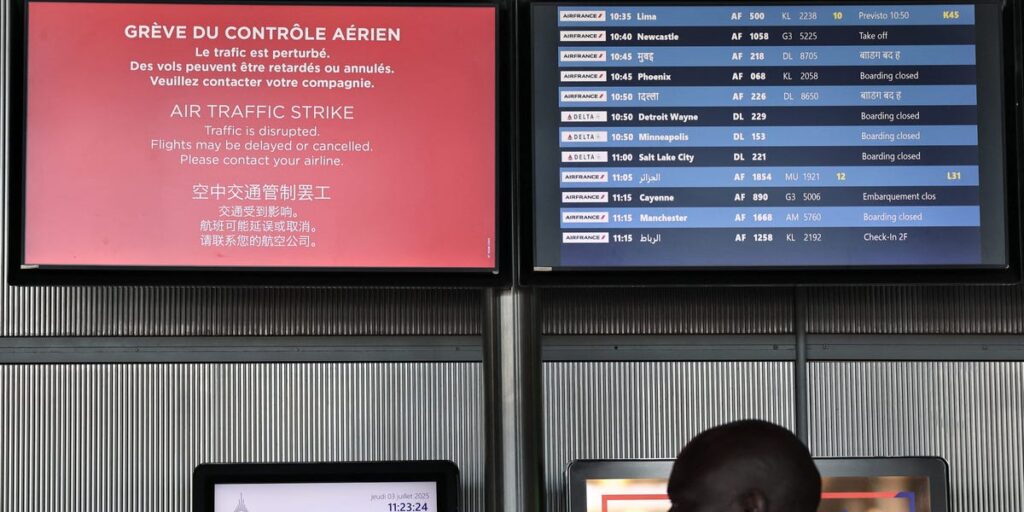Strikes by French air traffic controllers affected over a million people’s travel plans this month — and may be set to continue.
Citing understaffing and poor management from a government agency, France’s second-largest ATC union, UNSA-ICNA, went on strike on July 3 and 4.
Each day, an average of around 3,700 flights were delayed and 1,400 were canceled, according to a report from Eurocontrol, the central organisation for air traffic management on the continent.
It is estimated that this cost airlines around 120 million euros, or $140 million.
The effects spread beyond France, given the international nature of aviation, and the fact that many neighbors frequently fly over the country.
“An ATC strike in France has the potential to impact a third of flights across the continent, showing the disproportionate impact that disruptions in one busy country can have on the European network as a whole,” Eurocontrol wrote in its report.
It added that Spain was the worst affected, followed by France and the UK.
What does this mean if you have travel plans in Europe
While the unions haven’t announced any further action, it’s possible there may be more strikes.
France’s transport minister, Philippe Tabarot, called the demands “unacceptable” and expressed annoyance that strikes were targeted in the busy summer vacation travel period.
UNSA-ICNA wants pay rises in line with inflation following a 2023 agreement, more staffing, and better working conditions.
Ryanair CEO Michael O’Leary said in a statement last Friday: “What’s stopping French air traffic controllers from closing the EU skies again next week or the week after with more of these unjustified recreational strikes?”
The Irish budget airline, Europe’s biggest, canceled 170 flights affecting 30,000 passengers.
This all means you should be wary if you’re flying to France this summer, or have another journey flying over the country, known as an overflight.
If your plan is to travel between two European countries, the continent at least has a strong rail network as an alternative. The Eurostar also links the UK and France.
However, European Union legislation about compensation for flight delays absolves airlines when there are “extraordinary circumstances,” which include strikes outside their control.
Nonetheless, airlines are still obligated to get passengers to their destination on the next available flight.
With no deal on the horizon, disruption could occur again.
O’Leary has called on EU President Ursula von der Leyen to quit if she can’t guarantee protections for overflights during ATC strikes and maintain full staffing during the first wave of departures each day.
Meanwhile, British budget airline easyJet saw its stock price fall more than 5% Thursday morning after declaring a £15 million ($20 million) hit due to the strike. That was despite higher profits, although fuel costs also went up.
“We are extremely unhappy with the strike action by the French ATC in early July, which, as well as presenting unacceptable challenges for customers and crew, also created unexpected and significant costs for all airlines,” said CEO Kenton Jarvis.
Were you affected by French air traffic control strikes? Have you experienced a European flightmare this summer? Contact this reporter at psyme@businessinsider.com
Read the full article here


